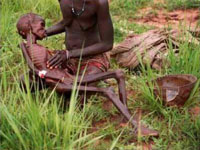Rich Countries Are At a Loss to Feed the Poor
Leaders and high officials of rich and well-developed countries failed to come to universal solution of problem of world hunger on Monday after a global summit rebuffed a U.N. call to commit billions of dollars a year for a new strategy to help poor countries feed themselves.

The meeting at the U.N. Food and Agriculture Organization did unite nearly 200 countries behind a pledge to increase aid to farmers in poor countries to help the developing world lessen its dependence on foreign food aid.
Only hours after the three-day summit began, some 60 heads of state and dozens of ministers rejected the U.N.'s call to commit $44 billion annually for agricultural development in these nations. The final declaration also omitted a pledge, sought by the United Nations, to eradicate hunger by 2025.
U.N. officials say roughly 1 billion people — one of every six people on the planet — don't get enough to eat.
As the conference opened, U.N. Secretary-General Ban Ki-moon told participants it was unacceptable that so many go hungry even though the world has enough food.
Helping the poor become self-sufficient lies at the core of food security, he said. "Our job is not just to feed the hungry, but to empower the hungry to feed themselves."
FAO, which is hosting the conference at its headquarters, says the share of international aid that is allocated to agriculture has steadily declined over the last three decades. Helping the hungry has largely entailed rich countries sending food assistance rather than technology, irrigation help, fertilizer or high-yield seed. Much of this food aid is purchased from the wealthy nations' own farmers.
While the summit agreed on the need to increase agriculture's share of international aid, it did not allocate the $44 billion annually — 17 % of overall foreign aid — the FAO says is necessary to feed a population that is expected to grow to 9 billion by 2050.
Vatican Radio called the lack of a firm money commitment "disturbing," while humanitarian groups claimed the summit had largely failed. Greenpeace called the declaration "empty rhetoric," while Oxfam said the strategy it laid out was "honorable" but that nothing had been done to ensure funds and hold governments accountable for their promises.
FAO's Assistant Director-General Alexander Mueller said governments kept away from firm commitments due to the economic crisis and because they expect they will need to channel money to the developing world at next month's summit on climate change in Copenhagen.
Delegates from the United States, the world's No. 1 food donor, say they believe wealthy nations should follow the specific needs of each recipient country rather than allocate a fixed amount to agriculture.
Kanayo Nwanze, the president of the International Fund for Agricultural Development, said poor countries cannot expect the rest of the world to come up with all the money they need and should instead invest a greater share of their own public funds in the sector, according to the Associated Press' report.
Subscribe to Pravda.Ru Telegram channel, Facebook, RSS!





